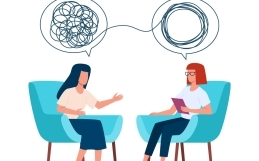“The past does not cause the problem in the present. Recreating the problem in the present that might have been shaped in the past creates the problem.”
– Michael Kerr
“Everything is about her. She never takes responsibility for her actions, and whenever I’m upset, she gets mad at me for it. It’s like I always have to be the rational one, the apologetic one. It was the same thing growing up. I always had to give in and be the one to apologize to my mother, even when I did nothing wrong. She was always pissy about something, and it was my ‘job’ to smooth things over. Oh, shit. I just realized something: I married my mother.” Max, embarrassed that he hadn’t seen it before, placed his face in his hands as he let the impact of this life-changing realization wash over him.
You see, Max was doing what most of us unknowingly do: He was replaying a painfully disappointing relationship from his past. Now that he was aware of it, we could talk about why it was happening and what he could do about it.
So, why do we so often find ourselves replaying our most challenging relationships—especially the ones we had with our parents? Some might come up with Freudian explanations, like being jealous of your father and wanting to kill him so you can marry your mother. But this isn’t what it’s all about. When we marry someone like one of our parents, it’s not as though we’re trying to wed our actual parent; rather, we’re unconsciously replaying the emotional process of the parental relationship. In other words, whatever we hated about that parental relationship gets more screen time in our most intimate relationship. Trust me, I know how disappointing this must sound. I married my mother in male form, so believe me, I get it. But I promise there’s a silver lining. There’s a way to make changes, even when you find yourself replaying a relationship dynamic that you’d rather delete from your past.
Date at Your Same Emotional Level
If you’re still reading this, you might be relating to what I’ve been describing—and you’re probably ready to break the cycle. To do this, it’s important to first understand what’s underlying that cycle. The existing theories on the topic basically put it this way: We date at our same level of emotional maturity. In other words, the relationships we enter reflect our personal level of maturity and development.
Before you get upset about that last statement, let me explain. Emotional maturity takes different forms and is usually the driving force motivating the choices we make in our relationships. Basically, emotional maturity is a marker of our ability to separate thinking from feeling. Emotionally mature people are less reactive to their emotions when in relationship with others. They make choices based on values and principles rather than anxiety. Emotionally immature people, on the other hand, are driven by anxiety and ultimately lack a sense of self.
Let’s take my client Max as an example. On the surface, he might have seemed more mature than his wife and mother because of his patterned way of accepting blame and smoothing things over. But in reality, it takes a certain level of maturity to realize that you don’t have to rush to make things better in your relationships. It’s actually the more productive choice to let other people smooth out their own difficulties.
Repeating unwanted patterns is an indication that you’re functioning in an emotionally immature way, letting emotions, rather than logic run the show. This is the result of unresolved emotional attachment that spans multiple generations. When Max started viewing his relationship patterns from this perspective, he came to understand that he and his wife were actually on the same emotional level. He was seeking relationships to gain the attention, approval, and love that he didn’t receive in childhood.
Max grew up in a very critical environment; the vulnerability he experienced early in life made him eager to please others. He learned to adjust who he was in order to keep his family in harmony and avoid their criticism. As he grew older, his need for emotional closeness and approval grew, pushing him into the arms of someone with the same type of emotional functioning. By choosing relationships on the basis of his anxiety, he created the very things he didn’t want in his relationships. He always found himself with critical, demanding, and unapologetic women. Oops!
How to Break the Pattern
In order to start creating more satisfying relationship dynamics, you must develop a stronger sense of self. This will keep you from making anxious investments in other people and help you stop abandoning yourself to please others. The process of developing a more solid sense of self is all about learning who you are so you can start showing up in your relationships. It’s an intentional practice of resolving the past so you can be free to make wiser choices.
It’s up to you to communicate your needs and choose someone who honors, cherishes, and loves you the same way you honor yourself. If you don’t learn to love, honor, and cherish yourself, you’ll settle, and your needs won’t get met. If you’re already in a relationship, make the choice to start communicating your needs. Set higher standards for how you’re treated, and step it up in your self-love and self-care efforts. By practicing making yourself a priority, you improve your ability to choose relationships that are right for you. Give yourself permission to let go of the past, and remember that it’s up to you to make changes so you don’t recreate the past.
Can you relate to what you’ve read here? Did you marry your mother or father? I’d love to hear your story!
Did you enjoy reading this article?
Once a week I send out a newsletter with new articles and unique content for readers. It is my way of staying in touch with you and giving you free advice based on some important topics.
Click here to sign up for my newsletter.
Know anyone that has a hard time saying no? Steer them to my latest book “When It’s Never About You” just released on Kindle! It is available for customers to order here. If you think they will prefer a hard copy, no problem, it will be available on October 24th!
Talk soon,
Dr. Ilene
Article edited by Dr. Denise Fournier





